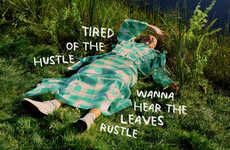PETA scored a major victory against Australian sheep farmers when H & M banned Australian wool from their designs. The dispute arose of a practice called mulesing. This is removal of skin from the tail to prevent flies from laying eggs in the folds. A statement from H & M said they would start looking for Australian wood alternatives.
Implications - A company that fails to support humane and ethical production procedures can receive a great amount of pressure and negativity from the public. So, it is important for a brand that relies on positive consumer opinion to make ethics a priority. Events like this show how the positive publicity that results from making an ethically sound stand can often more than make up for the effort it requires.
Boycotting to Force Change
PETA Gets H & M to Change Wool
Trend Themes
1. Ethical Consumerism - Brands are increasingly being pressured to support humane and ethical production procedures to avoid public backlash.
2. Alternatives to Traditional Materials - Companies are actively seeking alternative materials to replace controversial or unethical raw materials in their products.
3. Public Opinion Influencing Brand Strategy - Brands are realizing the importance of aligning with ethical values to maintain positive consumer sentiment and avoid reputational damage.
Industry Implications
1. Fashion and Apparel - The fashion industry is being forced to address ethical concerns and find innovative alternatives for controversial materials like wool.
2. Sustainable Materials and Textiles - The sustainable materials industry has an opportunity to offer innovative and ethical alternatives to traditional raw materials like wool.
3. Public Relations and Branding - Public relations firms and branding agencies can play a key role in helping brands navigate ethical challenges and communicate their ethical initiatives to the public.






